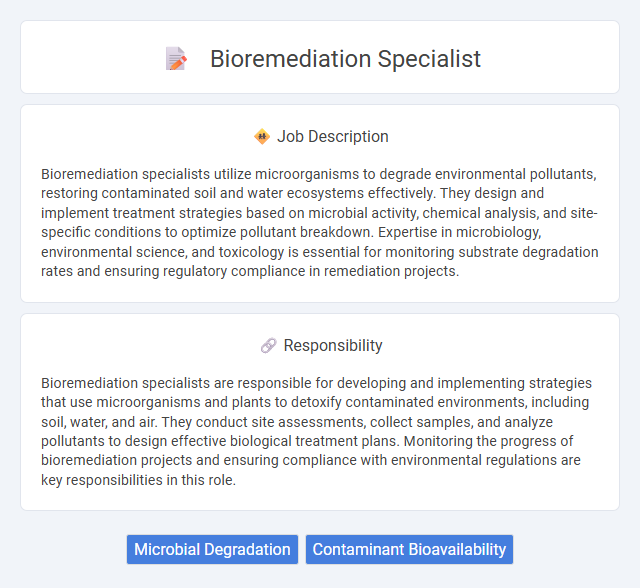
Bioremediation specialists utilize microorganisms to degrade environmental pollutants, restoring contaminated soil and water ecosystems effectively. They design and implement treatment strategies based on microbial activity, chemical analysis, and site-specific conditions to optimize pollutant breakdown. Expertise in microbiology, environmental science, and toxicology is essential for monitoring substrate degradation rates and ensuring regulatory compliance in remediation projects.
Individuals with a strong interest in environmental science and a passion for solving ecological problems are likely suited for a bioremediation specialist role. Those comfortable with fieldwork, laboratory analysis, and interdisciplinary collaboration might find the job fulfilling and manageable. People who thrive in dynamic, problem-solving environments and have a tolerance for variable working conditions probably perform well in this career.
Qualification
Bioremediation specialists typically require a bachelor's degree in environmental science, microbiology, or chemical engineering, with many employers preferring candidates who hold a master's degree or Ph.D. in related fields. Essential qualifications include expertise in microbial ecology, soil science, and chemical contaminant analysis, alongside practical experience in field sampling and laboratory techniques. Certifications such as HAZWOPER (Hazardous Waste Operations and Emergency Response) further enhance a candidate's qualifications for handling contaminated sites safely.
Responsibility
Bioremediation specialists are responsible for developing and implementing strategies that use microorganisms and plants to detoxify contaminated environments, including soil, water, and air. They conduct site assessments, collect samples, and analyze pollutants to design effective biological treatment plans. Monitoring the progress of bioremediation projects and ensuring compliance with environmental regulations are key responsibilities in this role.
Benefit
Hiring a bioremediation specialist likely enhances the effectiveness of environmental cleanup efforts by using natural microbial processes to degrade contaminants. This expertise probably reduces remediation costs and minimizes ecological impact compared to conventional methods. Companies may benefit from improved regulatory compliance and community trust through sustainable pollution management.
Challenge
Working as a bioremediation specialist likely involves facing complex environmental challenges requiring innovative solutions to degrade pollutants effectively. The role probably demands adapting to diverse contamination scenarios and unpredictable site conditions, which can complicate treatment strategies. Specialists might often need to balance ecological concerns with regulatory standards, making problem-solving a critical and ongoing challenge.
Career Advancement
Bioremediation specialists develop expertise in microbial and enzymatic processes to restore contaminated environments, enhancing their value in environmental consultancy and government agencies. Mastery in advanced biotechnological methods and project management facilitates progression to senior scientist or environmental manager roles. Continuous certification and research contributions accelerate career advancement and leadership opportunities in the field.
Key Terms
Microbial Degradation
A Bioremediation Specialist focused on microbial degradation expertly employs specific microorganisms to break down hazardous pollutants in contaminated environments, enhancing soil and water quality. This role involves isolating and optimizing microbial strains capable of metabolizing hydrocarbons, heavy metals, and industrial waste, thereby facilitating eco-friendly remediation processes. Proficiency in molecular biology techniques and environmental assessment tools is essential for monitoring microbial activity and ensuring effective contaminant removal.
Contaminant Bioavailability
A Bioremediation specialist evaluates and enhances contaminant bioavailability to optimize microbial degradation processes in soil and water environments. They apply advanced techniques such as surfactant amendment, bioaugmentation, and biostimulation to increase the accessibility of hydrophobic pollutants like polycyclic aromatic hydrocarbons (PAHs) and heavy metals. By understanding contaminant partitioning and sorption dynamics, these experts design effective remediation strategies to accelerate pollutant breakdown and restore ecosystem health.
 kuljobs.com
kuljobs.com